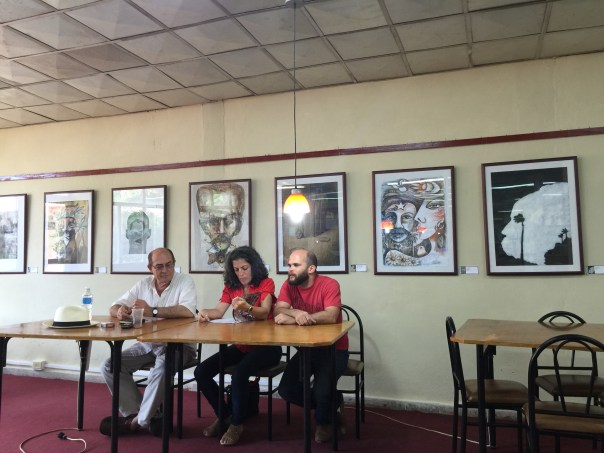
Juan Madrid was, alongside Manuel Vázquez Montalbán (Andrea Camilleri’s Inspector Montalbano is named in homage to the Catalan writer), González Ledesma and Andreu Martín – one of the founders of what came to be known as la novela negra Española, a combination of hard-boiled detective novel, investigative journalism, a semi-Marxist analysis of structures, a thrall to the darker dimensions of sex and society, all textured within a pulp style of story-telling..

I have a particular love for the novels of Vázquez Montalbán, with his cynical attitudes to the rich, his love/hate relationship to literature (“For forty years I read book after book, now I burn them because they taught me nothing about how to live”), and his various recurring relationships (“My girlfriend is a call girl. My technical assistant, waiter, cook and secretary is a car thief called Biscuter. My spiritual and gastronomic adviser is a neighbor called Fuster”).
I taught at Ramon Lllul university in Barcelona at the turn of the last century, and reading Vázquez Montalbán’s novels was a way of learning about the city; in each, investigator Pepe Carvalho burned a book, cooked a dish, and was badly beaten up exploring one element of the city’s structure – the construction industry during the Olympics, football, etc.—through the investigation of a crime that then proceeded into an investigation of corruption at the heart of the city, its neighbourhoods, its social structures; all with a wise-guy lippyness and a lightly-worn learnedness, one tinged with the ennui of a man who knows too much, that’s simultaneously funny and sad.
 Madrid was in EICTV in San Antonio to launch his new novel, Los hombres mojados no temen a la lluvia, already winner of the 14th Premio Unicaja de novela Fernando Quiñones in Spain, but published in Cuba as part of the Colección ORBIS, Editorial Arte y Literatura, by the Instituto Cubano del Libro.
Madrid was in EICTV in San Antonio to launch his new novel, Los hombres mojados no temen a la lluvia, already winner of the 14th Premio Unicaja de novela Fernando Quiñones in Spain, but published in Cuba as part of the Colección ORBIS, Editorial Arte y Literatura, by the Instituto Cubano del Libro.
I’d not had the chance to read Juan Madrid’s work before but his talk, impressively erudite, ranging from the quotation of Marx’s opening sentence in The Communist Manifesto (“A spectre is haunting Europe”), to a history of the formation of national police forces in Europe, their rationale (to preserve order and protect the interests of the ruling class) and so on, made me want to read Los hombres mojados no temen a la lluvia (which translates literally as ‘Made’ Men Don’t Fear the Rain).
It’s a novel with a world one happily sinks into and is absorbed by: it’s structured as a paternal melodrama, which gives the resolution of the crime not only a hook and a coda but also texture, an extra layer of depth. The spark that starts off the drama is a missing DVD of an S&M orgy featuring the rich and the powerful. Liberto Ruano is the lawyer who gets embroiled in the case and, in exploring the links between high finance and the mafia, ends up finding out who he is. The ingeniously plotted narrative is set in a Madrid of low-rent brothels and long-standing watering holes in the process of change. Though it’s set in the present, Madrid’s Madrid is always dialectically imbricated in the past; thus an exposition of a particular place, is also an explanation of what it once was, what it meant, who owned it, who went there and how much a meal cost.

The story is set now but the Francoist Spain of the sixties with its strictures, norms and power relations are an important, even necessary, part of the story and its telling: the answer to the castrations of the present lie in the forbidden sexuality of the past, yesterday’s taboo is today’s totem. I was also very intrigued by the paraphrasing, so light as to be almost an unacknowledged quotation, of the Johnny Guitar dialogue (‘Lie to me. Tell me that you love me’) I wrote about recently here; or rather by the way the protagonists in the story, Liber and Ada, use it to talk to each other; they reiterate but without attribution. Thus, to the uninitiated, the impression is of a heightened romanticism; to those in the know, that plus a suggestion that what links the characters is a love for what Johnny Guitar represents, precisely this type of heightened, fatalistic romance. I liked Los hombres mojados no temen a la lluvia so much I scoured central Havana to find another novel by Madrid and succeeded in finding Pájaro en mano/ Bird in the Hand (2007), which I liked just as much. I mean to read more.
I wanted to interview Madrid. Some of his novels have been adapted into films: Dias Contados (Imanol Uribe, Spain, 1994) is especially notable for Javier Bardem’s extraordinary performance as a rattled drug addict and small-time police informer. He also wrote the script or the Brigada Central TV series. I wanted to find out more about his views on noir and on cinema and also about how one of the key chroniclers of Spain’s transition to democracy and its aftermath is now being published in Cuba and printed by the ‘Imprenta Federico Engels’. I sense there’s a story there. But though we met and I told him how much I liked his talk, I was too shy to impose any further.
José Arroyo
